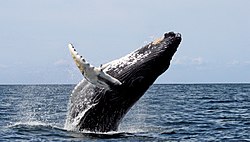Japan backs down from hunting Humpback whales
Friday, December 21, 2007

Image: Whit Welles.
Japan has backed down from a highly controversial plan to hunt endangered humpback whales off Antarctica, after fierce criticism by Australia. The Japanese whaling fleet, however, still plans to hunt almost 1,000 whales this season. Today's decision will save 50 humpback whales that Japanese whalers had planned to catch and kill in Antarctic waters.
Environmental group Greenpeace welcomed the decision, but the Japanese whaling fleet is still planning to catch around a 1,000 minke and fin whales - its largest catch ever - for what the government calls "scientific research."
Japan has been under pressure from conservation groups, the United States, Australia and New Zealand not to hunt humpback whales - which are considered near extinction.
Australia increased that pressure on Wednesday when it announced it would send a ship and planes to track the Japanese fleet and gather evidence that could be used to mount a legal challenge to Japanese whaling. Greenpeace Australia's chief Steve Shallhorn, says it was Australia's firm stand that forced Tokyo's turnaround.
"I think there's little doubt the Australian intervention has caused Tokyo to change its mind," he said. "I think the Japanese government found that they could not defend the killing of humpback whales, which are listed under appendix A of the CITES convention, which is the international trade on endangered species convention."
A Japanese government spokesman says Friday's decision was made after talks with the International Whaling Commission, which is currently chaired by the United States. The spokesman says he hopes his government's decision will lead to better ties with Australia.
Although Tokyo vigorously defends the whale hunt as scientific research, whale meat - a delicacy in Japan - ends up in supermarkets. On Wednesday, Australian Foreign Minister Stephen Smith said bluntly that the Japanese hunt was not science, but "the slaughter of whales."
Related news
- "Japan fishermen clash with surfers over 2007 dolphin hunt" — Wikinews, November 21, 2007
- "Southern Ocean whale slaughter to resume" — Wikinews, January 3, 2006
- "Greenpeace activists clash with Japanese whaling fleet in Southern Ocean" — Wikinews, December 22, 2005
- "Japanese whaling ship to dock in Hobart" — Wikinews, December 22, 2005
- "Japan to hunt 950 whales for "scientific research"" — Wikinews, November 21, 2005
- "International Whaling Commission adjourns for private talks" — Wikinews, June 21, 2005
Sources
- Heda Bayron. "Japan Backs Down from Hunting Humpbacks" — VOA News, December 21, 2007
- "Japan drops humpback whale hunt" — BBC News Online, December 21, 2007